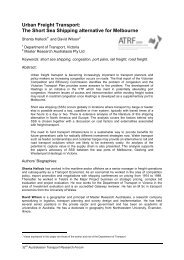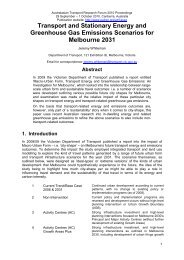victorian electric vehicle trial mid-term report - Department of Transport
victorian electric vehicle trial mid-term report - Department of Transport
victorian electric vehicle trial mid-term report - Department of Transport
- No tags were found...
You also want an ePaper? Increase the reach of your titles
YUMPU automatically turns print PDFs into web optimized ePapers that Google loves.
WORKPLACE CHARGING CASE STUDYVICTORIAN EV TRIAL HOUSEHOLD PARTICIPANTOne household participant supplied with a Nissan LEAF had a workplace commute <strong>of</strong> around 40 kilometreseach way. Their normal <strong>vehicle</strong> was a current model Volkswagen Golf GTI, for which the Nissan LEAF is areasonable comparison for assessment <strong>of</strong> EV acceptance. Prior to commissioning <strong>of</strong> their workplace chargingoption they described the <strong>vehicle</strong> as being a pleasure to drive, but significantly limited by the available rangewith a home charging option alone –‘It prevented me from doing anything more than simply driving to and from home, which has meant that most <strong>of</strong> thetime I left the <strong>vehicle</strong> for my wife to drive’.Following commissioning <strong>of</strong> the workplace charging option, the participant said their perception <strong>of</strong> the EV hadbeen transformed –‘I don’t have to worry at all about range now… it’s just like a normal car’.Further assessment <strong>of</strong> the costs and benefits revealed some interesting findings. Based upon the <strong>report</strong>ed fueleconomy figure for the Golf GTI, this household participant would spend around $45 per week on fuel costs fortheir commute alone (using petrol priced at $1.40/L). When asked as to what they would be prepared to pay forthe workplace charging option, the participant was <strong>of</strong> the opinion that the service should either be free or nomore than the cost <strong>of</strong> the <strong>electric</strong>ity supplied under a commercial tariff (which is likely to be cheaper than theirresidential tariff). Under a commercial tariff the cost <strong>of</strong> the <strong>electric</strong>ity consumed by workplace charging <strong>of</strong> theirLEAF can be approximated as $5.50 per week, which would be in addition to the $9 per week they would pay fortheir home charging contribution to the commute (assuming $0.25/kWh for GreenPower).This suggests that even if required to meet the <strong>electric</strong>ity costs <strong>of</strong> their workplace charging use, the <strong>trial</strong>participant would save around $30 per week on transport energy costs from their commute as compared totheir Golf GTI, or nearly $1,400 across the working year (46 weeks).CREATING A MARKET 77
















